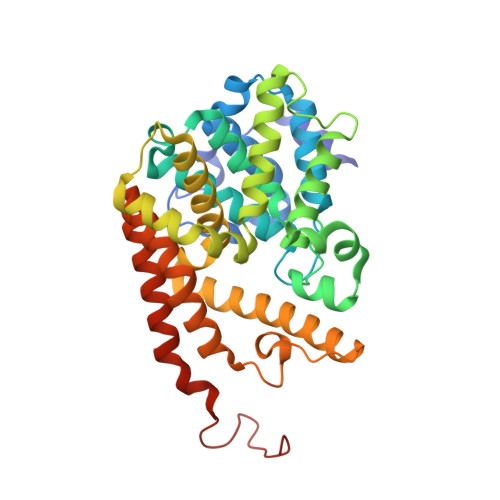Application of Structure-Based Design and Parallel Chemistry to Identify a Potent, Selective, and Brain Penetrant Phosphodiesterase 2A Inhibitor.
Helal, C.J., Arnold, E.P., Boyden, T.L., Chang, C., Chappie, T.A., Fennell, K.F., Forman, M.D., Hajos, M., Harms, J.F., Hoffman, W.E., Humphrey, J.M., Kang, Z., Kleiman, R.J., Kormos, B.L., Lee, C.W., Lu, J., Maklad, N., McDowell, L., Mente, S., O'Connor, R.E., Pandit, J., Piotrowski, M., Schmidt, A.W., Schmidt, C.J., Ueno, H., Verhoest, P.R., Yang, E.X.(2017) J Med Chem 60: 5673-5698
- PubMed: 28574706
- DOI: https://doi.org/10.1021/acs.jmedchem.7b00397
- Primary Citation of Related Structures:
5U7D, 5U7I, 5U7J, 5U7K, 5U7L - PubMed Abstract:
Phosphodiesterase 2A (PDE2A) inhibitors have been reported to demonstrate in vivo activity in preclinical models of cognition. To more fully explore the biology of PDE2A inhibition, we sought to identify potent PDE2A inhibitors with improved brain penetration as compared to current literature compounds. Applying estimated human dose calculations while simultaneously leveraging synthetically enabled chemistry and structure-based drug design has resulted in a highly potent, selective, brain penetrant compound 71 (PF-05085727) that effects in vivo biochemical changes commensurate with PDE2A inhibition along with behavioral and electrophysiological reversal of the effects of NMDA antagonists in rodents. This data supports the ability of PDE2A inhibitors to potentiate NMDA signaling and their further development for clinical cognition indications.
Organizational Affiliation:
Pfizer Worldwide Research and Development , Eastern Point Road, Groton, Connecticut 06340, United States.

















